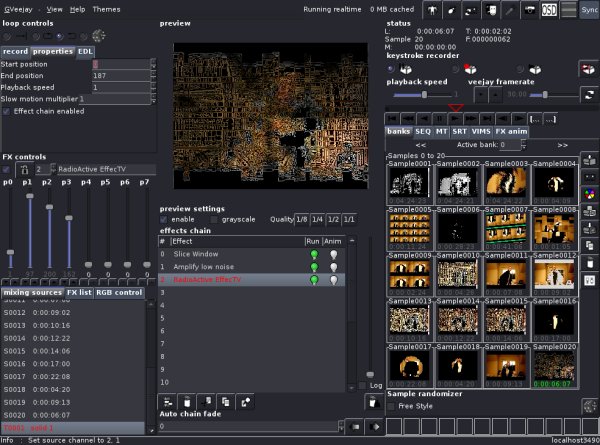 The Quasar DV codec (libdv) is a software codec for DV video, the encoding format used by most digital camcorders, typically those that support the IEEE 1394 (a.k.a. FireWire or i.Link) interface.
The Quasar DV codec (libdv) is a software codec for DV video, the encoding format used by most digital camcorders, typically those that support the IEEE 1394 (a.k.a. FireWire or i.Link) interface.
Libdv was developed according to the official standards for DV video: IEC 61834 and SMPTE 314M.
A number of people have made significant contributions the libdv source code. See the AUTHORS file for the current list.
Status.
I consider libdv to be in beta for 1.0 release. There are now several projects using libdv.
Libdv can decode most DV streams, and has a fairly mature encoder. A fair amount of x86 optimized code is in place, although I estimate we are still 2-3x slower than the best commercial software codecs.
There are a number of sample applications included with libdv, including playdv and encode.
Documentation.
Not much, yet. Documentation is the most important pending task for reaching 1.0.
SourceForge hosts several libdv mailing lists.
Those seriously interested in working with the code will want to acquire the standards documents, but we can't provide them because they're not free. SMPTE 314M is sufficient and reasonably priced. It is available from SMPTE for about $34 USD.
Sony has freely-available document called DVCAM Format Overview that provides many of the details from the standards. DVCAM differs from regular DV in the physical tape, the compression format is unchanged. This should help a great deal in understanding libdv source code.
Download.
The current release is available at our libdv summary page on SourceForge.
We also have a sample video file for testing purposes. Be warned: this file is BIG, about 105MB. For the curious, this file was captured with a Canon Elura camcorder (now discontinued). The camera was operating in its progressive-scan mode, which is better suited to computer display. The scene is of a popular duck-pond (for the ducks anyway) here on OGI's campus.
Background.
Arne Schirmacher maintains an excellent Digital Video for Linux page.
For general information on DV, DV Central is a good place to start.
Please note that this software is only concerned with the DV video compression format, which is different from capturing the data from a camcorder. Most DV camcorders have an interface which can be connected to an IEEE 1394 (aka "Firewire") interface in a computer. See Arne's page for pointers to 1394 related software.
Similar packages:
- libdv4-dev
- libdv4
- gstreamer0.8-dv
- dvbackup
- libiec61883-0
- libiec61883-dev
- flac
- kino
- libtheora-bin
- dvgrab
- libavcodec-unstripped-52
If you liked this article, subscribe to the feed by clicking the image below to keep informed about new contents of the blog:










0 comments:
Post a Comment